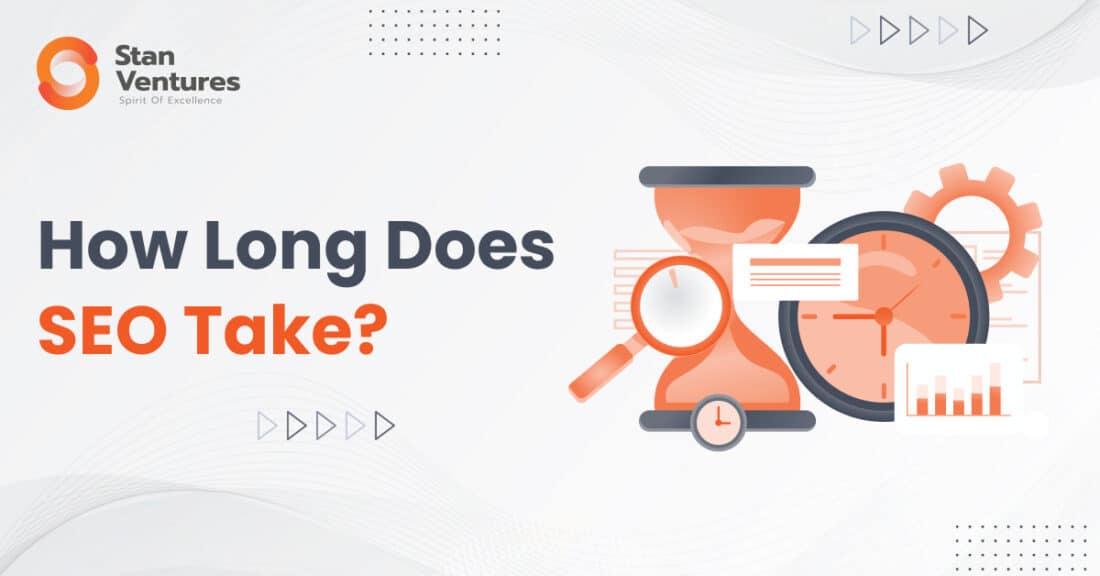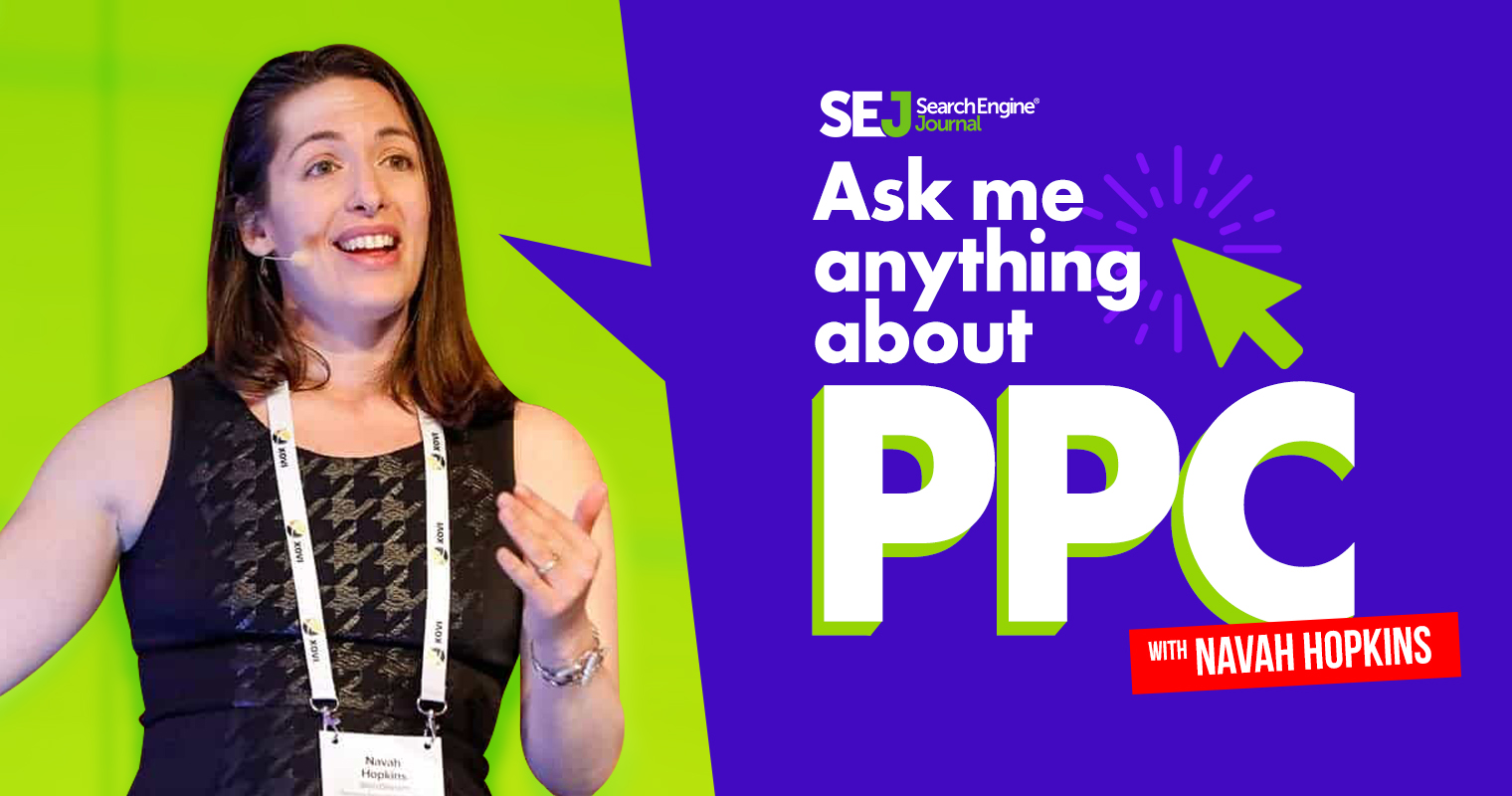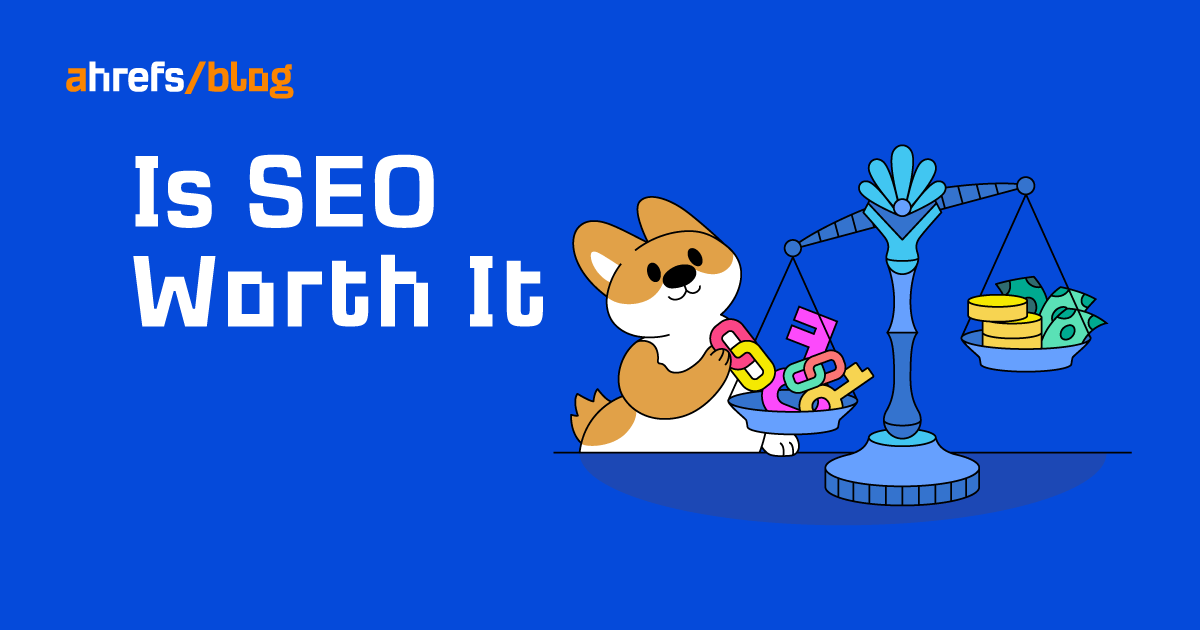How Long Does SEO Take?
Are you curious to know how long SEO takes to fetch the results you wanted all along? Don’t worry, you’re not alone. Well, with businesses like yours investing so much in SEO, there’s nothing wrong with wanting to know...

Are you curious to know how long SEO takes to fetch the results you wanted all along? Don’t worry, you’re not alone.
Well, with businesses like yours investing so much in SEO, there’s nothing wrong with wanting to know what happens to the investment.
This is precisely why “how long does SEO take to show results?” has become the most commonly asked question in the digital marketing space.
Truth be told, SEO isn’t as fast as its paid media counterparts. While it takes time, channelized SEO efforts can produce long-lasting results.
So, let’s break down the factors that drive SEO success to figure out the ‘how long’ part.
What is SEO Success?
As you know, SEO success is your main objective. But how do you know you have achieved success? How do you measure it?
Your SEO success depends on your goals and KPIs. While your goal is to boost your return on investment within a specific time frame, your KPIs in SEO can be increasing organic traffic to your website, boosting your online visibility, achieving top search engine rankings and more.
So, if you reach these milestones with your SEO efforts, you can consider the mission accomplished. This is how it works.
Why SEO Success is Not Immediate
Search engine optimization is, of course, a dynamic space. SEO did take time to refine itself and transform into what it is today.
In fact, there was a time when all that mattered was simply finding out and using keywords that could drive more website traffic. Plus, you could build as many backlinks as you want and get away with it just like that.
As the process was simple, people started trickling search engines by stuffing keywords and building bulk backlinks with no bother about the link quality. In other words, they tricked search engines with cheap tactics to pull up their websites to the top of SERPs.
This, in turn, prompted search engine giants like Google to roll out advanced algorithm updates advocating enhanced user experience from time to time.
Given the scenario, SEO today is being driven by natural language search that involves user queries consisting of one or two keywords.
Plus, web pages with high-quality, relevant links are pulled to the top while their spammy counterparts are penalized by search engines. After all, a search engine penalty can lower the rankings of corresponding websites in no time.
So, SEO isn’t mechanical anymore as it now heavily relies on changing user searches with a major focus on satisfying the user intent.
You have to come up with innovative strategies and execute them gradually to meet the altering parameters to achieve your goals and KPIs.
This is precisely why you CANNOT achieve SEO success overnight.
Silos of SEO Success
Now that you know what SEO success exactly is, let us decode the three silos that determine how long SEO takes for you.
Technical SEO
Do you know a technical error of any form can drive both users and search engine bots away from your website?
Yes, this is why you need to run a technical audit and fix bugs at the earliest. Technical SEO includes checking on the following components and more.
Page speed Duplicate content Canonicalization Structured data XML sitemaps HreflangContent
Content is one of the top search engine ranking factors. Google prioritizes fetching the best search results for a user query over anything else.
Creating low-quality content means it takes longer to see expected SEO results. In the worst-case scenario, it may not happen at all.
You need to make sure you create high-quality content that matches the user intent and addresses search queries accordingly.
To do this, you can read relevant content that performs well, figure out what makes the difference and come up with a better version.
When it comes to publishing new content on your website, ensure that you stick to a consistent schedule for two reasons.
One, this signals Google that you add new content to your website on a regular basis. Two, it prompts more visitors to return to your website frequently, which denotes a great user experience.
Backlinks
Creating backlinks means improving the credibility of your website. Yes, backlinks tell Google that your site is a reliable source of information.
However, as said earlier, spammy link building practices for high rankings don’t work anymore. Ultimately, link quality is all that matters.
Given the scenario, gaining fewer high-quality backlinks from relevant websites will produce a greater SEO impact.
In other words, a relatively stable link velocity (the speed at which you gain links) is what is healthy for your website.
If you adhere to Google’s guidelines, it shall happen naturally.
Factors Determining the Time Frame for SEO Results
The time frame to show SEO results usually depends on the following factors.
Website History
Your website history certainly influences the time taken to see SEO results.
For instance, it should take more time for a new website than an already established one. This is because an existing website might have built a domain authority and at least a few backlinks.
On the other hand, for a new website, you have to do everything from scratch and that makes a big difference in SEO.
However, it also doesn’t always mean that an established website can lead the way in SEO because it depends on various factors such as search engine penalties, algorithm updates and much more.
Competition
The competition in your industry or business is something you cannot ignore when optimizing your website for search engines.
The more the competition, the longer you need to take your website to the top of SERPs.
You have to identify the intensity of competition to rank web pages, channelize your SEO efforts and find more innovative ways to perform better than the other industry players.
Keyword Targeting
Keywords are your trump to rank for relevant user searches online. So, you need to rightly identify keywords based on keyword search volume, length, popularity and user intent.
Poor keyword targeting may cost you all your dedicated efforts while producing a negative SEO impact.
Use keyword research tools such as Google Trends and Google Keywords for effective keyword research.
When you insert relevant keywords in your content, make sure they aren’t stuffed but fit the natural flow of the content.
Website Structure & Design
Your website design and URL structure also play a crucial role when optimizing the website for search engines like Google.
For instance, if a user finds it complicated to navigate between different landing pages of your website or meets a dead-end displaying a 404 error because of a broken link, your website is certainly not user-friendly.
And Google isn’t fond of web pages that don’t advocate a smooth user experience.
So, optimising these components of your website is mandatory, especially if you want to boost your SEO progress.
Also, run a mobile-friendly test to make sure you don’t miss out on the visitors who access your website from a mobile browser.
Budget
The budget you have in mind is another factor that decides how long SEO takes to show results for you.
When you build an SEO strategy for your website, you have to ask yourself if you have a predefined budget to stick to in order to execute your plan accordingly.
From this standpoint, a convenient budget can be one of the driving forces behind your SEO growth.
Backlink Profile
Link building is one of the major search engine ranking factors.
Google considers backlinks as votes of confidence to weigh and rank websites. The more relevant and powerful your backlinks are, the better your chances of ranking higher.
Earn high-quality backlinks from authoritative websites in your niche to strengthen your backlink profile.
Some marketers opt for paid backlinks to quicken the process. However, this tactic may backfire if the search engine finds out that you’ve gained a significant number of backlinks in a short period of time.
With link building service providers like Stan Ventures, you can rest assured that the backlinks built are using a manual outreach strategy and are safe.
However, make sure you don’t fall prey to black hat link building methods that are still prevalent in the industry. Otherwise, you may end up facing Google’s wrath, which will affect your website’s SEO adversely.
Potential Issues and Penalties
Before expecting the search engine to rank you higher, you need to fix the potential issues that are stopping your SEO progress. These issues can be anything from hosting errors to search engine penalties.
Resolving issues such as 301 redirects and 404 errors will bring positive results for your website.
Other issues include robots.txt issues, sitemaps, .htaccess, web.config files and more.
While fixing these errors can drive positive results for your SEO, Google doesn’t consider all these changes at once. It does take time based on the number of issues and how they are fixed.
Content Strategy
As you know, content is king. So, you need to spend a great deal of time creating and publishing content that adds value to your visitors.
However, creating and publishing content isn’t the end. You should have a well-targeted content strategy in place to manage your content efficiently. Sometimes, you may also have to consistently revamp your existing content to perform better.
As you do this, you should also have a constant eye for Google’s guidelines and algorithm updates. This way, you can make necessary changes to your content strategy at the earliest and improve your chances of ranking higher.
On-Page and Off-Page Strategies
You need to do things both within and outside your website to increase your search engine visibility, drive more traffic and boost your ROI. In other words, on-page and off-page strategies are equally important for SEO.
Optimize your meta tags, header, anchor text, titles, descriptions, and alt tags. These are the crucial on-page SEO components.
As for off-page SEO, focus on earning backlinks using 100% manual blogger outreach strategy. Additionally, make sure that links are built only from websites with genuine organic traffic.
The truth is the best metric to assess the quality of a website is to check if Google is sending its users to it.
That should help you perform better both off-page and on-page.
Resources
Sometimes, some professional help is all that you need to get the edge you look forward to, and SEO is no exception.
The resources you leverage to optimize your website is another important factor influencing how long it takes for SEO to work.
Unlike the other factors, you can take complete control of your resources. Make sure you get the best professional assistance to optimize your site for search engines.
Get in touch with the team from time to time to understand the strategies they devise to rank your site better and keep track of the progress.
Stages of SEO
Identifying which stage of SEO your business is in will help you figure out where you need to focus.
SEO can be broken down into 3 different stages.
Enhance Build ExpandLet’s discuss each one of them in detail.
Enhance
If you’re just starting to do SEO for your business website, your site is in this phase. In this stage, you will focus on improving what your site already has.
Strengthening your existing website is critical to scaling it up in the right direction and achieving substantial SEO results in the days to come.
Let’s say your website has 15 pages. You have to focus on optimizing these pages for search engines using the right keywords, high-quality content, internal linking and more. This phase focuses mainly on leveraging on-page SEO strategies.
Speaking of on-page SEO, many sites overlook technical SEO. To be honest, streamlined technical SEO is essential to unlock the maximum ranking potential of your website. So, make sure you don’t miss out on technical SEO optimization.
Build
Optimizing your existing pages is good, but it is just a baby step. After enhancing your existing pages, you have to create more new SEO- optimized pages.
Why?
That’s how you scale up your website to boost your online visibility.
Setting up your official social media handles, for instance, to present accurate information about your business and the products or services you offer, is a part of this phase.
Expand
Going forward, you have to get your site ranked higher in order to be easily discoverable to your target audience. As a result, you will get more visitors to your website and that will increase your conversion rate. That’s what the third and final stage of SEO is about.
In this phase, your SEO efforts go beyond your page. The main goal here is to position your website as an authority in your niche and boost your search engine rankings.
For example, backlink building is a critical part in this stage. Backlinks are, of course, a top Google ranking factor. This way, you get more websites to vouch for your credibility and get Google to reward your site with higher rankings for relevant searches online.
How to Know if SEO is Working?
Okay. That’s, of course, an important question. Let’s get to the answer straight away.
You know your SEO efforts are actually working when your web traffic and search engines for targeted keywords improve.
Again. It doesn’t happen all of a sudden. It takes time, and that can be anywhere from a few weeks to months.
SEO needs constant and consistent effort to produce results and that’s why you need to spend time at least on a weekly basis, if not every day.
How Long It Takes For SEO To Start Working For Your Brand
SEO is an ever-evolving space and the SEO needs are never the same for two different websites.
That said, one can only make an educated guess based on different variables but never give exact numbers as to how long it takes for SEO to work.
As Google puts it, “In most cases, SEOs need four months to a year to help your business first implement improvements and then see potential benefit.”
Practically, once you get started with SEO, you are never going to stop because both your existing business rivals and new industry players will constantly try to steal your position on Google.
In simple words, SEO is a forever race with no dead end.
The Timeframe for SEO
Finally, let’s answer the real question, “How Long Does SEO Take?”.
From what we have seen so far, the timeframe for SEO depends on various factors. After all, no two websites start from the same place, even if they belong to one niche and face the same competition.
Generally, with the right SEO strategy in place, 6 to 12 months should do to see your efforts working. This subsequently catalyzes your business growth.
Here’s a bigger picture of what your SEO pathway looks like and the results you can get out of it.
Month 1:
The first month shall cover research and discovery, a technical audit of the website, keyword planning and strategy.
The research and discovery phase may sometimes take an entire month. But, if that is done soon, a website audit and keyword planning shall follow.
Month 2:
Once the technical audit is done, you can make changes according to the audit results.
While the modifications are happening, you are still doing SEO but cannot see results. This is because the impact will start to take place once the overhaul is completed.
Meanwhile, you can work on building link profiles and high-quality content for your website.
Month 3:
Start placing a major focus on content production, including blogging, whitepapers, FAQs and other business-related content.
By the end of the third month, you will start seeing improvements in your website’s search engine ranking.
This is because the technical overhaul should have ended by now. Pairing this scenario with content production, you will begin seeing your SEO efforts work.
Besides improving your search engine rankings, your leads can start translating into sales, which is an extra perk.
Month 4:
With more content creation and technical optimization of your website, you can build a robust link profile.
This month, you can expect an increase in website traffic, lead generation and search engine rankings.
While the improvements won’t be anywhere near the progress you should make in 12 months. It’s certainly significant enough to know that your SEO efforts are working.
In fact, as per Google (in most cases) SEOs need 4 months to implement improvements and see potential benefits.
So, we’re on track as of now.
Month 5:
It’s a wise move to start including social media management into your SEO plan by this month or even earlier.
With social media incorporation, you can promote your content better and boost direct traffic to your website.
You can also initiate PR and outreach activities to drive more traffic and gain qualified leads.
Month 6:
You should be witnessing more incoming visitors to your website.
From now on, you can concentrate on producing more engaging content and promoting the same across platforms.
You can personalize the process based on the unique needs of your business. Make sure you follow a consistent schedule.
Realistic Expectations for SEO Results
Time and again, people think SEO has some Harry Potter magic attached to it. But given the scenario, you need to have realistic expectations for your SEO results.
Let me break it down for you
Short-Term Results
Speaking on realistic terms, SEO doesn’t rain massive results out of nowhere. It is gradual. If someone promises you desired SEO results in days, it’s spam. Black hat practices are likely to be behind the scenes.
If Google finds out that you leverage black hat SEO practices to drive results, your site will be penalized. Based on the intensity of the penalty levied, your site may receive low rankings or may not rank on Google at all. Sounds like a nightmare, right?
So, what do genuine SEO results look like?
If you see small improvements, like your site ranking for some of the targeted keywords, in a few weeks, that’s genuine. That’s a sign that your site is growing the right way.
Long-Term Results
So, what do these long term results look like?
If you see your website driving increased organic traffic in months after you invest in SEO, that’s probably a consolidated result of genuine and consistent effort.
Let me show you some real data from the Stan Ventures portfolio.
One of the clients running an online smoke shop was getting 3500+ monthly website traffic when they reached out to us in April 2022.

We offered our managed SEO services, a 360-degree SEO suite, to an online smoke shop. With focused keyword targeting and high-quality backlink building, we were able to drive nearly 8000 monthly visitors to their website in 5 months. That’s 2X organic traffic growth for our client’s site.
Check out the data below.

Maintaining and Improving Rankings
SEO isn’t a one-time process. Yes, it will help you boost your rankings, attract more visitors and get more conversions.
But then, it requires consistent attention and effort to maintain or improve your position in SERPs. If not, your competitors may steal your ranking and push you down. This will affect your online visibility.
Fret not. It doesn’t require as much effort as you put in initially. All you have to do is spend time on a regular basis monitoring your rankings. If you see a dip in rankings or traffic, make sure you tweak your SEO strategies accordingly to win back your visitors.
7 Ways to Drive SEO Results Faster
Now that you know what SEO results look like, here’s how you can gear up SEO outcomes for your website.
So, let’s delve in with no further delay.
Fix Technical Issues
Never underestimate technical issues. They can overshadow your genuine SEO efforts and ruin things for your website by driving search engine bots and users away if left unnoticed.
That’s why you need to run a technical audit and fix bugs at the earliest. It includes checking on duplicate content, canonicalization, structured data, XML sitemaps,hreflang and more.
Fix these issues to improve your site structure in every possible way, and you will start seeing positive results in just a few weeks. Also, make sure to consistently do the checks.
Create Link-Worthy Content
Create high-quality, informative content that others in your industry want to link to.
When it comes to publishing new content on your website, ensure that you stick to a consistent schedule for two reasons.
This signals Google that you add new content to your website on a regular basis. It prompts more visitors to return to your website frequently, which denotes a great user experience.Target Low Competition Keywords
Ranking for keywords with high competition may take time. So, when you want to rank faster, it is wise to focus on keywords with low competition.
However, there is no point in ranking for keywords no one is searching for.
Conduct keyword research to find out low competition keywords with a decent search volume (probably a few hundred monthly searches) and target them.
These can be location-based keywords or product/ category-based keywords with commercial intent.
Boost Page Speed
High page loading speed is something both Google and your website users are fond of.
That said, you need to focus on your website’s page speed to witness SEO results faster.
Run a page speed test on Google PageSpeed Insights to see how fast your website loads on desktop and mobile devices.
In case your website has a slow page loading speed, look for potential issues and fix them to boost page speed.
Focus on E.E.A.T
E.E.A.T stands for Experience, Expertise, Authoritativeness and Trustworthiness. Google certainly eyes these factors when ranking websites.
Devise your SEO strategies in such a way that they come in handy to showcase your industry expertise, authority and credibility.
Craft your content and build your link profile based on E.E.A.T. That’s another way to drive SEO results at a faster pace.
React Quickly
Whether you are leveraging your in-house marketing team or outsourcing SEO, if you are relying upon some kind of help from field experts for SEO, make it a point to react to the ideas and suggestions from your team as early as you can.
This will prompt your team to either implement an SEO strategy or make changes to it according to your responses.
Quicker responses mean the process is always on, which is paramount to doing SEO and prompting a faster outcome.
Begin Early
SEO is a highly competitive space and you don’t see results instantly.
That said, if you prefer to achieve SEO results at a faster pace, you need to begin with it as early as possible.
While it often takes anywhere from 3 months to 6 months for SEO to work, you need to get set at the earliest to beat your competitors and stand your ground in the long run.
Never Give Up
Remember, SEO is nothing short of a marathon. Sometimes, you may not see results and want to give up. Don’t ever do that.
Truth said, the more competitive your industry is, the more time it takes to reach your SEO milestones.
However, it is always worth it. Never forget that.
Final Thoughts
SEO isn’t the same for two different websites mainly because the needs of every website are unique. Identifying what your website needs to rank higher in search is the key to figuring out how long SEO takes for you. Even then, the time frame will be an estimate and not an exact number.
Google is rolling out algorithm updates frequently and that makes it almost impossible to answer the frequently asked question- how long does SEO take?
By following the above-mentioned steps closely, you will be able to achieve your SEO milestones faster than you will without a blueprint.
Author
Ananyaa Venkat
Ananyaa has been penning down industry-specific content for 6+ years. With blogging as her special interest, she loves exploring multiple verticals to keep track of dynamic market trends.

 Astrong
Astrong 
































